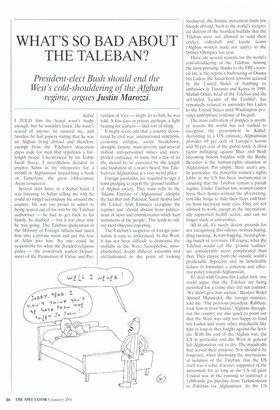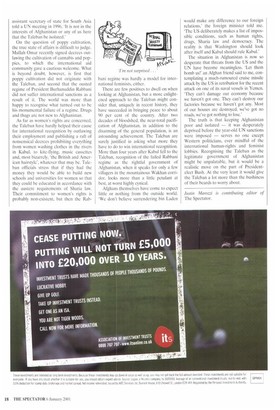WHAT'S SO BAD ABOUT THE TALEBAN?
President-elect Bush should end the West's cold-shouldering of the Afghan
regime, argues Justin Marozzi
Kabul I TOLD him his beard wasn't bushy enough, but he wouldn't listen. He wasn't scared of anyone, he assured me, and besides, he had papers stating that he was an Afghan living abroad and therefore exempt from the Taleban's draconian dress code for men that stipulates a fistlength beard. Unconvinced by his feeble facial fleece, I nevertheless decided to employ Salim as my interpreter for a month in Afghanistan researching a book on Tamerlane, the great 14th-century Asian conqueror.
Several days later, in a Kabul hotel, I was listening to Salim telling me why he could no longer accompany me around the country. He was too proud to admit to being scared out of his wits by the Taleban authorities — he had to get back to his family, he claimed — but it was clear why he was going. The Taleban spokesman in the Ministry of Foreign Affairs had taken him into a private room and put the fear of Allah into him. No one could be responsible for what the dreaded religious police — the evocatively named Department of the Promotion of Virtue and Pre vention of Vice — might do to him, he was told. A few days in prison, perhaps, a light beating for starters — that sort of thing.
It might seem odd that a country devastated by civil war, international sanctions, economic collapse, social breakdown, drought, famine, mass poverty and several million anti-personnel mines and unexploded ordnance, to name but a few of its ills, should be so exercised by the length and bushiness of a man's beard, but Taleban-run Afghanistan is a very weird place.
Foreign journalists are required to sign a form pledging to report the 'ground realities' of Afghan society. They must refer to the 'Islamic Emirate of Afghanistan' (despite the fact that only Pakistan, Saudi Arabia and the United Arab Emirates recognise the regime) and 'should abstain from publications of news and commentaries which hurt sentiments of the people'. This tends to rule Out most objective reporting.
The Taleban's suspicion of foreign journalists is easy to understand. In the West, it has not been difficult to demonise the mullahs in the West. Xenophobic, unsophisticated, deeply illiberal, extremist and old-fashioned to the point of looking mediaeval, the Islamic movement finds few friends abroad. Such is the world's reciprocal distrust of the bearded mullahs that the Taleban were not allowed to send their cricket, volleyball and karate teams (Afghan women need not apply) to the Sydney Olympics last year.
There are several reasons for the world's cold-shouldering of the Taleban. Among the most pressing, thanks to the FBI's wanted list, is the regime's harbouring of Osama bin Laden, the Saudi-born terrorist accused by the United States of bombing its embassies in Tanzania and Kenya in 1998. Mullah Omar, head of the Taleban and the self-styled 'Leader of the Faithful', has repeatedly refused to surrender bin Laden to the United States until Washington provides appropriate evidence of his guilt.
The mass cultivation of poppies is another reason the world has not rushed to recognise the government in Kabul. According to a UN estimate, Afghanistan provides 80 per cent of Europe's heroin and 50 per cent of the global total. A third factor militating against Blair and Bush becoming bosom buddies with the Bushy Beardies is the human-rights situation in Afghanistan. Put simply, there aren't any. In particular, the powerful women's rights lobby in the US has been instrumental in ensuring that the Taleban remain a pariah regime. Under Taleban law, women cannot leave their homes without the all-covering, tent-like burcia to hide their faces and bodies from lascivious male eyes. They are not allowed to work, except in the internationally supported health sector, and can no longer study at universities.
All in all, it's surely decent grounds for not recognising this odious, woman-hating, drug-running, Koran-hugging, beard-growing bunch of terrorists. Of course, what the Taleban would call the 'ground realities' are considerably more complicated than that. They expose both the outside world's predictable hypocrisy and its lamentable failure to formulate a coherent and effective policy towards Afghanistan.
To deal with Osama bin Laden first, one could argue that the Taleban are being punished for a crime they did not commit. 'We didn't give him asylum,' Maulavi Wakil Ahmed Mutawakil, the foreign minister, told rue. 'The previous president, Rabbani, took him in from Sudan.' Afghans throughout the country are also quick to point out that the West was only too happy to fund bin Laden and many other mujahedin like him as long as they fought against the Soviets. With the end of the Afghan war, the US in particular and the West in general left Afghanistan out to dry. The mujahedin had served their purpose. Nor should it be forgotten, when discussing the international isolation of the Taleban, that the US itself was a solid, if secret, supporter of the movement for as long as the US oil giant Unocal was in the running to construct a 1,000-mile gas pipeline from Turkmenistan to Pakistan via Afghanistan. As the US assistant secretary of state for South Asia told a UN meeting in 1996, 'It is not in the interests of Afghanistan or any of us here that the Taleban be isolated.'
On the question of poppy cultivation, the true state of affairs is difficult to judge. Mullah Omar recently signed decrees outlawing the cultivation of cannabis and poppies, to which the international aid community gave a cautious welcome. What is beyond doubt, however, is first that poppy cultivation did not originate with the Taleban, and second that the ousted regime of President Burhanuddin Rabbani did not suffer international sanctions as a result of it. The world was more than happy to recognise what turned out to be his monumental failure of a regime. Drugs and thugs are not new to Afghanistan.
As far as women's rights are concerned, the Taleban have hardly helped their cause for international recognition by outlawing their employment and publishing a raft of nonsensical decrees prohibiting everything from women washing clothes in the rivers in Kabul, to kite-flying, music cassettes and, most bizarrely, 'the British and American hairstyle', whatever that may be. Taleban officials stress that if they had the money they would be able to build new schools and universities for women so that they could be educated in accordance with the austere requirements of Sharia law. Their commitment to women's rights is probably non-existent, but then the Rab bani regime was hardly a model for international feminists, either.
There are few positives to dwell on when looking at Afghanistan, but a more enlightened approach to the Taleban might consider that, uniquely in recent history, they have succeeded in bringing peace to about 90 per cent of the country. After two decades of bloodshed, the near-total pacification of Afghanistan, in addition to the disarming of the general population, is an astounding achievement. The Taleban are surely justified in asking what more they have to do to win international recognition. More than four years after Kabul fell to the Taleban, recognition of the failed Rabbani regime as the rightful government of Afghanistan, when it speaks for only a few villagers in the mountainous Wakhan corridor, looks more than a little petulant at best, at worst highly cynical.
Afghans themselves have come to expect little or nothing from the outside world. 'We don't believe surrendering bin Laden would make any difference to our foreign relations,' the foreign minister told me. 'The US deliberately makes a list of impossible conditions, such as human rights, drugs, Sharia law and democracy. The reality is that Washington should look after itself and Kabul should rule Kabul.'
The situation in Afghanistan is now so desperate that threats from the US and the UN have become meaningless. 'Let them bomb usl' an Afghan friend said to me, contemplating a much-rumoured cruise missile attack by the US in retribution for the recent attack on one of its naval vessels in Yemen. 'They can't damage our economy because we haven't got one. They can't destroy our factories because we haven't got any. Most of our houses are destroyed, we've got no roads, we've got nothing to lose.'
The truth is that keeping Afghanistan poor and isolated — it was desperately deprived before the year-old UN sanctions were imposed — serves no one except Western politicians, ever mindful of the international human-rights and feminist lobbies. Recognising the Taleban as the legitimate government of Afghanistan might be unpalatable, but it would be a realistic move on the part of Presidentelect Bush. At the very least it would give the Taleban a lot more than the bushiness of their beards to worry about.
Justin Marozzi is contributing editor of The Spectator.



















































 Previous page
Previous page